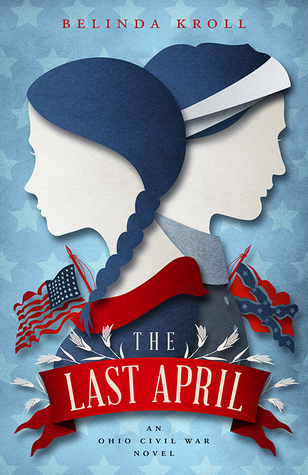
Split-second decisions have life-changing consequences in The Last April, a gripping and thought-provoking work of YA historical fiction by Belinda Kroll.
It’s April, 1865 and in the immediate aftermath of the Civil War, fifteen-year-old Gretchen Miller is in the garden of her family farm in rural Ohio when she’s startled by a Confederate soldier who falls in a dead faint literally steps from her feet. As Gretchen reaches his side, the feverish soldier mutters about his escape from Camp Chase, a training barrack/Confederate prison outside of Columbus. Realizing that the young soldier will die without her help, Gretchen reluctantly asks her acerbic spinster aunt, Tante Klegg, to help her take him into the house.
As the young soldier flits in and out of consciousness, Gretchen asks him his name – only to be told that he can’t remember anything about himself. She decides to temporarily call him Karl, hoping that her mother, Adelaide, will be more amenable to her announcement that they’re helping an enemy soldier if she knows he has a German background like them. However, Adelaide’s just learned that President Lincoln has been assassinated by a Confederate sympathizer and when she sees Karl, she becomes hysterical, believing that he killed Lincoln and that they’re all going to be charged for harboring him – a crime that’s punishable by death…
As pure entertainment, Kroll’s book is top-notch, but it is also full of fascinating and important historical detail. The narrative is interspersed with announcements from Washington, and excerpts from President Andrew Johnson’s speech, as well as from various articles written in The Ohio Daily Statesman, the newspaper of the day. Not only do all these sources give a different perspective on the events that unfolded, but they also underscore the prevailing confusion and fear of a fractured nation still trying to heal in the aftermath of a violent civil war. The novel adeptly balances fiction and history, conveying the essence and political upheaval of the period as an entertaining story.
At first blush, the title of Kroll’s book, The Last April, seems an odd choice. However, one soon realizes that the book is aptly named given the significance of April: it’s the last April that Abraham Lincoln is alive and the last April of Gretchen Miller’s innocence. Gretchen is the ideal protagonist for Kroll’s story. At fifteen, she’s got plenty of heart and common sense, and is the perfect foil for her high-strung mother and unbending aunt. Karl is also likable, due in part to his seeming ineptitude in managing to do anything right around the farm. Thankfully, the author doesn’t try and create the perfect “happily ever after” ending for her young protagonists. In the aftermath of war, Gretchen and Karl have the odds stacked against them yet together, they epitomize a future of promise, and that, in itself, is the perfect ending.
Finally, far beyond it being a great read – which it most certainly is – the book raises an important moral dilemma about helping one’s fellow man when that person happens to be the enemy. A thoughtful and well-written novel, The Last April is highly recommended for readers who may never read young adult or historical fiction, as the themes Kroll covers are timeless and vital.
Book Links
STAR RATING
Design
Content
Editing
Get an Editorial Review | Get Amazon Sales & Reviews | Get Edited | Get Beta Readers | Enter the SPR Book Awards | Other Marketing Services























Leave A Comment